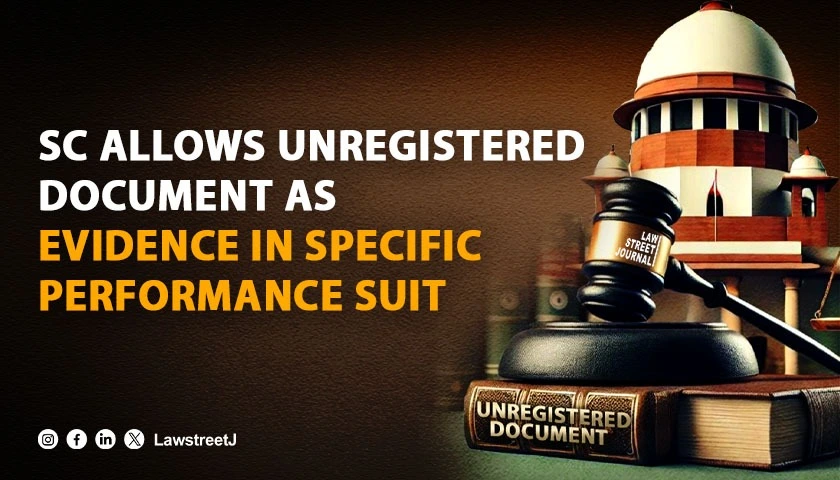New Delhi: The Supreme Court of India has delivered a significant judgment allowing unregistered documents to be admitted as evidence in suits for specific performance, emphasizing the importance of the proviso to Section 49 of the Registration Act.
Justices Pamidighantam Sri Narasimha and Joymalya Bagchi made crucial observations on the admissibility of unregistered documents in such cases.
The Court was dealing with an appeal against the order passed by the Madras High Court in CRP(PD) No. 2828 of 2015, which had dismissed a Civil Revision Petition filed by the appellant. The Supreme Court noted, “This appeal is against the order passed by the High Court of Judicature at Madras dismissing the Civil Revision Petition filed against the order passed by the Trial Court on 21.04.2015.”
The case involved an appellant who sought to place on record an unregistered document dated 01.01.2000 in a suit for specific performance. The Court observed, “It is the case of the appellant that on the basis of an agreement of sale dated 01.01.2000, the respondent agreed to sell his property upon receiving part consideration of Rs. 5000/- and also put the appellant in possession of the property.”
The Supreme Court highlighted the legal provision that allows such documents to be admitted, stating, “The prayer of the appellant in the interlocutory application falls under the proviso to Section 49 of the Registration Act, which provides that an unregistered document affecting immovable property may be received as evidence of a contract in a suit for specific performance.”
In a specific directive, the Court relied on its earlier judgment in S. Kaladevi v. V.R. Somasundaram, wherein the Court held that, “When an unregistered sale deed is tendered in evidence, not as evidence of a completed sale, but as proof of an oral agreement of sale, the deed can be received in evidence, making an endorsement that it is received only as evidence of an oral agreement of sale under the proviso to Section 49 of the 1908 Act.”
The Court further emphasized that the document was being introduced only as proof of an oral agreement of sale, stating, “It is the case of the appellant that the document sought to be brought on record is intended only to be used as proof of the oral agreement of sale and that it is permitted under Section 49 of the Registration Act.”
Accordingly, the Court allowed the appellant to introduce the document, while clarifying that it has not expressed any opinion on its contents, and that the respondent remains free to contest its relevancy and validity.
In conclusion, the Court allowed the appeal and set aside the judgment of the High Court, directing that the interlocutory application for marking the document dated 01.01.2000 be allowed.
Case Title: Muruganandam vs. Muniyandi (Died) Through LRs Civil Appeal No(s). 6543 of 2025











